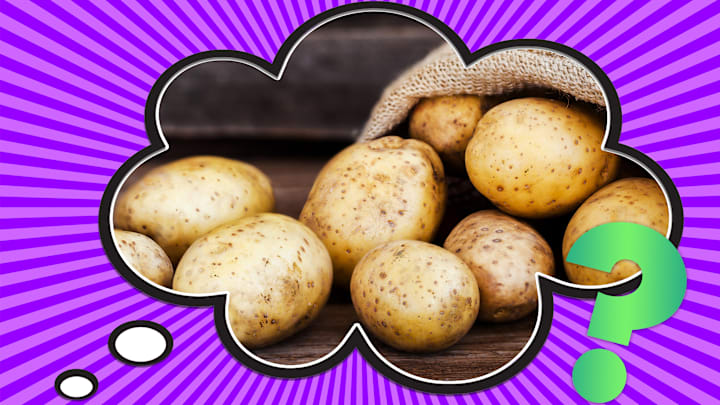Who says Americans don’t eat enough vegetables? According to the United States Department of Agriculture, the average person consumes roughly 50 pounds of potatoes per year. (A lot of them frozen, a lot of them fresh, and some in the form of potato chips.) Consumers love potatoes, and they also love giving them endearing nicknames, like tuber or tater.
The most common slang term, however, is probably spud. Unlike the others, it’s hard to discern how that name is derived from potato. So how did we come to say “spud”?
From Tool to Tuber
According to the Oxford English Dictionary, spud as slang for the vegetable dates back to 1845 and may have originated in New Zealand. The word itself is much older, though: Spud first popped up in English in the 1440s and initially a word for a knife or dagger. By 1667, it was being used to refer to a spade-shaped digging tool, a sense that was still in use in the early 19th century. “In making the pits or holes, the earth is taken out by a spade or spud,” R. W. Dickson wrote in an 1805 issue of Practical Agriculture. So it’s possible that spud as another name for potato came from the garden tools used to dig them up.
But spud wasn’t only used to refer to soil-moving tools. In the 1600s, it was also a rather rude slang term for a short person. Phillip’s New World of Words, published in 1706, defined it as “A short-arse, or little despicable fellow.”
How people took to using the name of a potato extraction tool—or “a little despicable fellow”—as the name for the potato itself is more of a mystery. (Though as Word Histories notes, it’s not the first time a root vegetable got its name from a gardening implement: Pastinaca, the Latin word for “parsnip” or “carrot,” derives from pastinum, a word for a two-pronged digging tool. They may have been so named because their roots resembled a pastinum.) But come the 1800s, spud was closely identified with the vegetable: Merchants known to sell bad potatoes were dubbed spuddys. And in some areas, spud referred specifically to a raw potato.
Another Spud Theory
There is one alternative theory about spud: that it came from the acronym SPUD, or the Society for the Prevention of an Unwholesome Diet, an alleged 19th century group of British farmers who wanted to discourage the import and consumption of potatoes from Ireland. Among their supposed concerns was that the vegetables were poisonous if improperly prepared. (They apparently also wanted to encourage consumers to buy turnips instead.) The etymology appeared in newspapers as early as 1930.
While potatoes were indeed portrayed negatively for a time—they were even accused of causing syphilis and lust, among other ailments—contemporaneous evidence of such an organization has yet to be found. In 1990, potato researcher Robert Rhoades characterized the story as improbable.
However it got here, spud has taken on many forms. In the early 20th century, workers who peeled potatoes were known as spud barbers, while in the military, the practice of peeling potatoes was called “spud bashing.” Illegal alcohol derived from potatoes was known as spud juice. A peasant might be referred to as a spud miner.
Most of these terms have fallen by the wayside, but spud remains firmly rooted in our language.
Get the Answers to More Big Questions:
A version of this story ran as part of a content partnership in 2012; it has been updated with new text for 2025.
